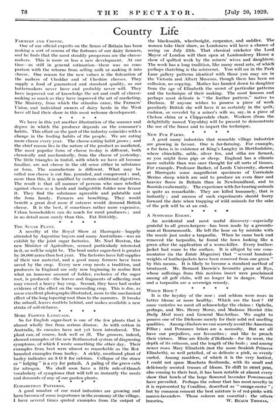We have in this yet another illustration of the manner
and degree in which the producer depends on the consumer's habits. This effort on the part of the industry coincides with a change in the feeding habits of the people. We are eating more cheese every year. The cheese-eating habit grows ; and the chief reason lies in the nature of the product as marketed. The most popular form of cheese to-day is different, both chemically and mechanically, from the cheese of yesterday. The little triangles in tinfoil, with which we have all become familiar, are not cheese in the old sense either in substance or form. The manufacture is different. What may be called raw cheese is cut fine, pounded, and compressed ; and, more than this, it is qualified by certain additional digestives. The result is that all manner of persons who once rebelled against cheese as a harsh and indigestible fodder now favour it. They find the substance agreeable and palatable and the form handy. Farmers are benefiting. They would benefit a great deal more if caterers would demand British cheese. It is the best, if sometimes rather more expensive. Urban householders can do much for rural producers ; and in no detail more surely than this. Eat Britishly.
















































 Previous page
Previous page